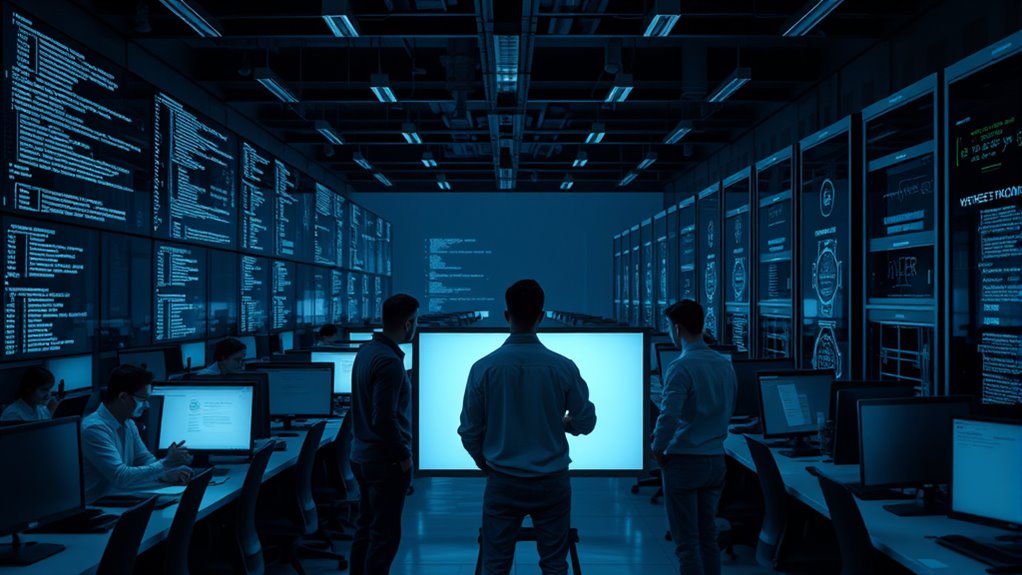The AI revolution is causing widespread layoffs as automation replaces many tech jobs, especially in administrative, data analysis, and customer support roles. Companies see AI as essential for staying competitive, which leads them to cut costs through automation. While this boosts efficiency, it also raises concerns about job security and ethical issues. To understand how this shift impacts the industry and what the future holds, explore the details further.
Key Takeaways
- AI advancements enable automation of tasks, leading to significant layoffs in administrative, data analysis, and customer support roles.
- Companies prioritize automation for efficiency and cost reduction, often resulting in workforce reductions.
- Ethical concerns about bias and transparency in AI systems impact public perception and organizational reputation.
- Workers face job displacement, prompting some to reskill, while others experience increased job insecurity.
- The ongoing AI-driven automation underscores the need for responsible management to balance innovation and social impact.

Have you noticed how the rapid advancements in artificial intelligence are reshaping the tech industry? It’s impossible to ignore the surge in machine learning capabilities that are powering smarter algorithms and automating complex tasks. Companies are increasingly leveraging these tools to boost efficiency, reduce costs, and stay competitive. But with this progress comes a wave of layoffs, as automation replaces thousands of jobs once held by humans. As your company adopts AI-driven solutions, you might feel both excited about innovation and apprehensive about job security. The shift underscores how deeply AI is transforming the workforce landscape, especially in technology sectors.
AI advancements are transforming tech, driving efficiency but causing layoffs and raising ethical concerns.
Machine learning, at the core of many recent AI breakthroughs, enables systems to learn from data and improve over time without explicit programming. While this benefits businesses by enabling faster decision-making and more accurate predictions, it also raises significant ethical concerns. For instance, as AI systems take on roles traditionally performed by humans, questions about fairness, bias, and accountability become more urgent. You may wonder whether these algorithms perpetuate existing biases or make decisions that lack transparency. The ethical concerns surrounding machine learning are driving many organizations to scrutinize their AI implementations, but not all are acting swiftly enough to address these issues. This adds another layer of complexity to the layoffs, as some companies face reputational risks or legal challenges tied to their AI use.
As automation becomes more prevalent, many roles—especially in administrative, data analysis, and customer support areas—are increasingly vulnerable. You might see colleagues or even yourself being laid off as machines handle tasks faster and cheaper. For some, this shift is a wake-up call to reskill and adapt, but for others, it’s a harsh reality of a changing job market. The companies behind these layoffs argue that AI is necessary to stay competitive in an evolving global economy, but critics warn that the rush to automate could deepen inequality and leave many workers behind. The debate continues as tech giants and startups alike navigate the balance between innovation and responsibility.
In essence, the AI revolution is driving efficiency and innovation, but it’s also creating a seismic shift in employment. As machine learning continues to advance and ethical concerns remain at the forefront, you’ll need to stay informed and adaptable. The challenge is to harness AI’s potential without sacrificing fairness or neglecting the human impact. The wave of layoffs is a stark reminder that, while automation may be the future of tech, it must be managed thoughtfully to ensure that progress benefits everyone, not just the bottom line.
Frequently Asked Questions
How Will AI Impact Non-Tech Industries Long-Term?
AI will considerably impact non-tech industries by automating routine tasks, boosting efficiency, and opening new opportunities. However, you’ll need to address ethical concerns like job displacement and guarantee data privacy to build trust with customers and employees. Long-term, AI can transform sectors like healthcare, retail, and manufacturing, but success depends on balancing innovation with responsible use, so you should stay informed about evolving regulations and ethical standards.
What Measures Are Companies Taking to Support Laid-Off Employees?
Imagine a safety net unfolding beneath falling leaves—that’s how companies support laid-off employees. They offer employee assistance programs to guide you through emotional and financial challenges, and career counseling to help you find new paths. These measures are designed to catch you gently, giving you the tools and confidence to land safely on your feet and explore fresh opportunities amidst change.
Will AI Create More Jobs Than It Eliminates?
AI will create more jobs than it eliminates, but automation ethics play a vital role. You need to stay adaptable and continuously learn new skills, especially as automation causes job displacement in certain sectors. While some roles may vanish, new opportunities emerge in AI oversight, development, and ethical management. Embracing change and understanding automation ethics helps you navigate the evolving job landscape and capitalize on the new jobs AI creates.
How Can Workers Reskill for Ai-Driven Automation?
You can reskill for AI-driven automation by enrolling in reskilling programs that focus on in-demand tech skills like data analysis, machine learning, and programming. Identifying the skill gap in your industry helps you target the right training. Stay proactive by attending workshops, online courses, and certifications, ensuring you’re prepared for evolving job requirements. Embracing continuous learning is key to remaining competitive in an AI-automated workplace.
What Are Policymakers Doing to Address Ai-Related Layoffs?
Policymakers are scrambling to turn the AI layoffs crisis into a social safety net bonanza. They roll out policy responses like expanded unemployment benefits, retraining programs, and even universal basic income proposals. While some say it’s enough to cushion the blow, others wonder if their efforts will keep up with relentless automation. Either way, you might want to start practicing your “I just lost my job to a robot” speech.
Conclusion
As the dawn of AI rises, it paints a new horizon—one filled with both hope and loss. You stand at the crossroads, witnessing the old guard fade into shadows while automation becomes the guiding light. Though change feels like a storm, remember it also clears the way for new seeds to grow. Embrace this transformation, for in the ashes of yesterday, the future’s brightest chapters are waiting to be written.










